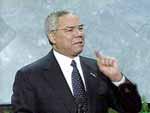Powell Outlines New US Foreign Policy"In what President-elect (George W.) Bush has called the distinctly American internationalism, there is no inclination whatsoever to have our nation withdraw from the world into a fortress of protectionism or an island of isolationism," Powell said at a Senate confirmation hearing. "America must be involved in the world, and we must be involved according to our national interest and not in some haphazard way that seems dictated more by the crisis of the day than by serious, thoughtful foreign policy," he said. Powell, who was former chairman of the Joint Chiefs of Staff, reiterated Washington's long-standing commitment to the "one China" principle, saying that the incoming administration will continue to work for a constructive relationship with China. "The United States has long acknowledged the view that there is only one China. In that respect, Taiwan is part of China," Powell said in a prepared opening statement at the hearing. As to Russia, the general said the relationship could be strong and successful only if Russia pursues domestic reform, establishing the rule of law, rooting out corruption, and stopping the proliferation of missile technology. He suggested that the North Atlantic Treaty Organization (NATO) be free to decide whether it would further expand eastward despite possible objections by Russia. "Our relations with Russia must not be dictated by any fear on our part," Powell said. "If we believe the enlargement of NATO should continue -- and we do believe that -- we should not fear that Russia will object. " On the controversial missile defense program, Powell said the United States should continue to move ahead "as aggressively as possible" to develop a missile defense system although a decision on whether to deploy it or not could be made later. "President-elect Bush has made it quite clear that he is committed to deploying an effective ballistic missile defense using the best technology available at the earliest date possible," he said. He said the Bush administration considers the Anti-Ballistic Missile (ABM) Treaty "probably no longer relevant to our new strategic framework" and is prepared "to persuade the Russians of the need to move beyond the ABM Treaty. "We should move forward as rapidly as possible with the technology, and when a system is ready to be deployed, I am sure that a prudent president will make a judgment at that time as to the nature of the threat," Powell said. "And if the threat is there and the threat is real, I am absolutely confident he will move forward with deployment." The U.S. plan to develop and deploy a missile defense system is very controversial in the United States and widely opposed by the international community because it will seriously undermine the global arms reduction efforts and global strategic stability. Although the Clinton administration deferred a decision on the deployment last September, the U.S. continues robust development of such a system. On the Middle East, Powell said the Bush Administration will treat the region as a whole while continuing its efforts to seek a solution to the Israeli-Palestinian conflict. "We seek a lasting peace based on unshakable support for the security of Israel, the legitimate aspirations of the Palestinian people, our friendships in the Arab world, and a hard-headed recognition that the parties themselves must make the peace," he said. "We also pledge to focus our efforts on the region as a whole, and not just on the peace process standing alone," he added. Powell deplored the recent violence in the Middle East region, noting that "you can't successfully pursue peace in the midst of such violence." Talking about Iraq, Powell vowed to tighten sanctions against the country despite an increasing international appeal for lifting the embargo imposed a decade ago. As to the Korean peninsula, Powell said the new administration will review overall U.S. policy on the peninsula, while taking into account what has been done by the Clinton administration. "So we are mindful of all the work that has been done, and we will use that work as we review our overall policy on the peninsula," he said, without elaborating. Powell expressed welcome to the ongoing dialogue between South Korea and the Democratic People's Republic of Korea, describing it as "a positive step." Powell, born in New York City on April 5, 1937, has been a professional soldier for 35 years. He was chairman of the Joint Chiefs of Staff from October 1, 1989, until his retirement on September 30, 1993, under both presidents George Bush and Bill Clinton. He served earlier as national security advisor to President Ronald Reagan. |
| People's Daily Online --- http://english.peopledaily.com.cn/ |
